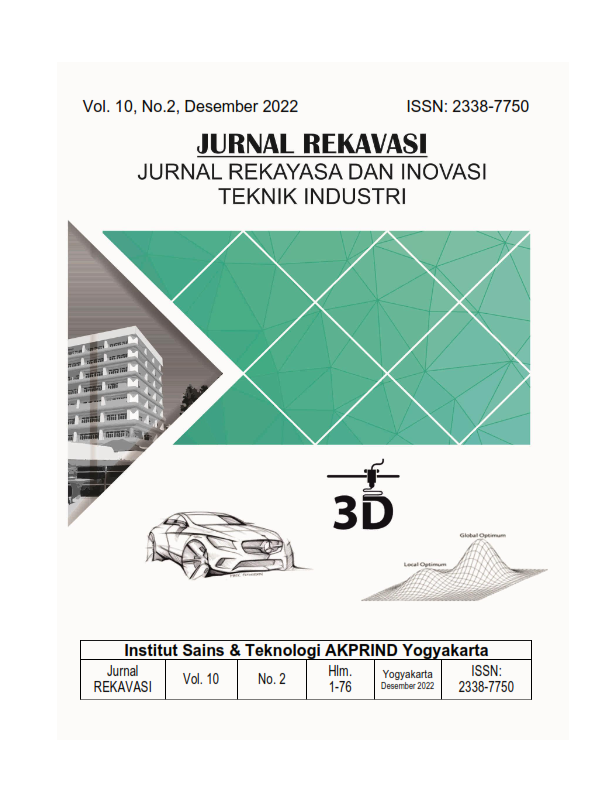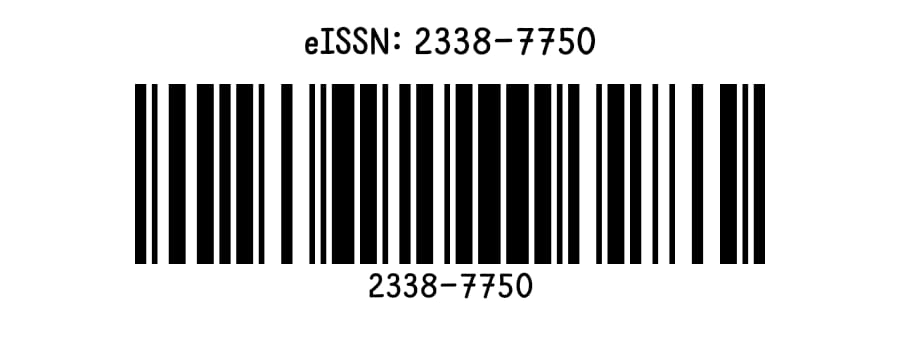PENGEMBANGAN MODEL THEORY OF PLANNED BEHAVIOR UNTUK ANALISIS NIAT MENGGUNAKAN TAS BELANJA RAMAH LINGKUNGAN PADA SUPERMARKET MODERN
DOI:
https://doi.org/10.34151/rekavasi.v10i2.4031Keywords:
theory of planned behavior, environmental awareness, support of banning plastic bags, eco-friendly shopping bags, multiple linear regressionAbstract
The use of eco-friendly shopping bags needs to be encouraged to reduce the use of plastic bags. According to the results of observations and interviews, it is known that the interest of students in using environmentally friendly shopping bags is still low. The aim of this study is to analyze the factors that influence the intention of students in using environmentally friendly shopping bags in the Special Region of Yogyakarta. This study uses multiple linear regression method. Purposive sampling is applied, with a sample of students from 5 universities as many as 100 respondents. Variables in this study using the development of Theory of Planned Behavior by adding variables of environmental awareness and support for the Prohibition of plastic bags. The results showed the correlation coefficient of 0.781 and the coefficient of determination of 0.609, which means there is a strong linear relationship between the dependent variable and all independent variables. Attitude variables, behavioral control and support for the Prohibition of plastic bags bags proved to have a significant effect on the intention to use environmentally friendly shopping bags for each value of regression coefficients were 0.221, 0.400 and 0.158, while the subjective norms and environmental awareness variables had no significant effect. For this reason, recommendations are given to variables that are proven to have a significant effect. Attitude variables are encouraged by promoting the use of environmentally friendly shopping bags to the public through various media, while for behavioral control variables, socialization needs to be carried out to the public regarding the importance of using environmentally friendly shopping bags and the adverse effects of using plastic bags. For recommendations related to variable support for the Prohibition of plastic bags can be done by encouraging plastic bag manufacturers to produce plastic bags from environmentally friendly materials (bioplastics).
References
Ajzen, I. (2011). The theory of planned behaviour: Reactions and reflections. Psychology and Health, 26(9), 1113–1127. https://doi.org/10.1080/08870446.2011.613995
Arı, E., & Yılmaz, V. (2017). Consumer attitudes on the use of plastic and cloth bags. Environment, Development and Sustainability, 19(4), 1219–1234. https://doi.org/10.1007/s10668-016-9791-x
Bong Ko, S., & Jin, B. (2017). Predictors of purchase intention toward green apparel products: A cross-cultural investigation in the USA and China. Journal of Fashion Marketing and Management, 21(1), 70–87. https://doi.org/10.1108/JFMM-07-2014-0057
Fishbein, M., & Ajzen, I. (2005). Theory-based behavior change interventions: Comments on Hobbis and Sutton. Journal of Health Psychology, 10(1), 27–31. https://doi.org/10.1177/1359105305048552
Gerakan Indonesia Diet Kantong Plastik. (2016). Program Kantong Plastik Berbayar di Ritel Moderen Dihentikan, Mengapa? Retrieved from https://dietkantongplastik.info/program-kantong-plastik-berbayar-di-ritel-moderen-dihentikan-mengapa/
Ghozali, I. (2011). Aplikasi Analisis Multivariate Dengan Program SPSS. Semarang: Badann Penerbit Universitas Diponegoro.
Hair, J.F., Black, W. C., Babin, J., & Anderson, R. E. (2010). Multivariate Data Analysis (Seventh ed). London: Pearson Prentice Hall.
Hair, Joseph F, Black, W. C., Babin, B. J., & Anderson, R. E. (2010). Multivariate Data Analysis Seventh Edition. Pearson Pretince Hall.
Jaiswal, D., & Kant, R. (2018). Green purchasing behaviour: A conceptual framework and empirical investigation of Indian consumers. Journal of Retailing and Consumer Services, 41, 60–69. https://doi.org/10.1016/j.jretconser.2017.11.008
Jamanti, R. (2014). Pengaruh Berita Banjir di Koran Kaltim Terhadap Kesadaran Lingkungan Masyarakat Kelurahan Temindung Permai Samarinda. EJournal Ilmu Komunikasi, 2(1), 17–33.
Jatiningrum, W. S., & Astuti, A. Y. (2019). The Effect of Demographic Character on the Intention of Muslim Consumer Behavior to Shop at Neighbor Store. Jurnal Teknik Industri, 20(1), 85. https://doi.org/10.22219/jtiumm.vol20.no1.85-93
Jatiningrum, W. S., Astuti, F. H., & Mastrisiswadi, H. (2021). Islamic Modern Retail Attributes for Muslim Consumers Patronage Intention. J@ti Undip : Jurnal Teknik Industri, 16(1), 21–28. https://doi.org/10.14710/jati.16.1.21-28
Kusuma, H. (2018). Kemenkeu Beberkan Alasan Kantong Plastik Perlu Kena Cukai. Retrieved from from:https://finance.detik.com/berita-ekonomi-bisnis/d-4349504/kemenkeu-beberkan-alasan kantong-plastik-perlu-kena-cukai.
Maulana, R. G. (2020). Pengaruh kebijakan kantong plastik berbayar, kesadaran lingkungan, dan green living terhadap minat beli produk organik. Universitas Muhammadiyah Surakarta.
Ohtomo, S., & Ohnuma, S. (2014). Psychological interventional approach for reduce resource consumption: Reducing plastic bag usage at supermarkets. Resources, Conservation and Recycling, 84, 57–65. https://doi.org/10.1016/j.resconrec.2013.12.014
Paul, J., Modi, A., & Patel, J. (2016). Predicting green product consumption using theory of planned behavior and reasoned action. Journal of Retailing and Consumer Services, 29, 123–134. https://doi.org/10.1016/j.jretconser.2015.11.006
Santos, S. C., Sousa, C. V. E., Sampaio, D. D. O., & Fagundes, A. F. A. (2013). The impact of using compostable carrier bags on consumer behaviour in the city of belo horizonte, brazil. Ambiente e Sociedade, 16(4), 1–18. https://doi.org/10.1590/S1414-753X2013000400002
Yuliana, S. (2016). Kajian Terhadap Kebijakan Kantong Plastik Berbayar Berdasarkan Analisis Perilaku Konsumen. Institut Teknologi Sepuluh Nopember.
Yursan, H. L., Hermawan, A., & Ekawanto, I. (2020). Consumer intention and behaviour towards the use of non-plastic shopping bags in Jakarta: preliminary study. Economic Review, 49(1), 5–18.










